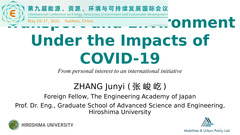Transport and Environment Under the Impacts of COVID-19

Start Time:2022-05-27 08:30 (Asia/Shanghai)
Duration:30min
Session:[S8] Public Security and Emergency Management » [S8-2] Public Security and Emergency Management-2
Tips: The file permissions under this presentation are only for participants. You have not logged in yet and cannot view it temporarily.
Abstract
The COVID-19 pandemic has imposed various impacts on the transport sector, which is however not irrelevant to the virus spread. While restrictions on travel and activities have brought about a decline in global environmental emissions, the repeated restrictions have made many people tired of further cooperation, leading to a rebound in the emissions. This speech will first describe the history and mechanisms of pandemics and then discuss the relationships between pandemics and transport, followed by an illustration of a pandemic policymaking approach: i.e., PASS approach. After introducing the speaker's personal research on COVID-19, an international initiative related to this report will be introduced, followed by a description of the impacts of COVID-19 on global CO2 emissions in all sectors and CO2 emissions in the transport sector of China. Furthermore, it is discussed how to make carbon reduction policies in the transport sector by developing a seamless process management approach. Finally, the speech will be wrapped up by introducing the first transport-related pandemic book "Transportation Amid Pandemics" (Elsevier, including 36 chapters) in the literature, published in 2022.
Keywords
Speaker
Junyi ZHANG
Hiroshima UniversityProf. Junyi Zhang has been a foreign fellow of The Engineering Academy of Japan since February 2021. His main research fields include urban and regional planning, transportation planning and engineering, environmental and energy policy, health policy, pandemic policy, tourism policy, sustainable development policy, and human behavior research. He is especially good at collaborating with researchers from different disciplines. He has developed various methodologies (surveys, modeling, policy evaluation, and planning, etc.) and applied them to analyze various issues related to the above fields from an interdisciplinary perspective. As of April 2022, he published 480+ refereed academic papers (SCI/SSCI papers: 100+). His research was awarded 12 times as best/outstanding paper awards. His recent four books are closely related to this international conference: Transportation Amid Pandemics: Practices and Policies, Elsevier (2022); Transport and Energy Research: A Behavioral Perspective, Elsevier (2019); Routledge Handbook of Transport in Asia (2018); Life-oriented Behavioral Research for Urban Policy, Springer (2017). He has been serving as a reviewer for 50+ SCI/SSCI journals and as an editorial board member or an associate editor for 10+ internationally well-recognized journals. Currently, he is the co-chair of the WCTRS (World Conference on Transport Research Society) COVID-19 Task Force (from April 2020-present).
Comment submit